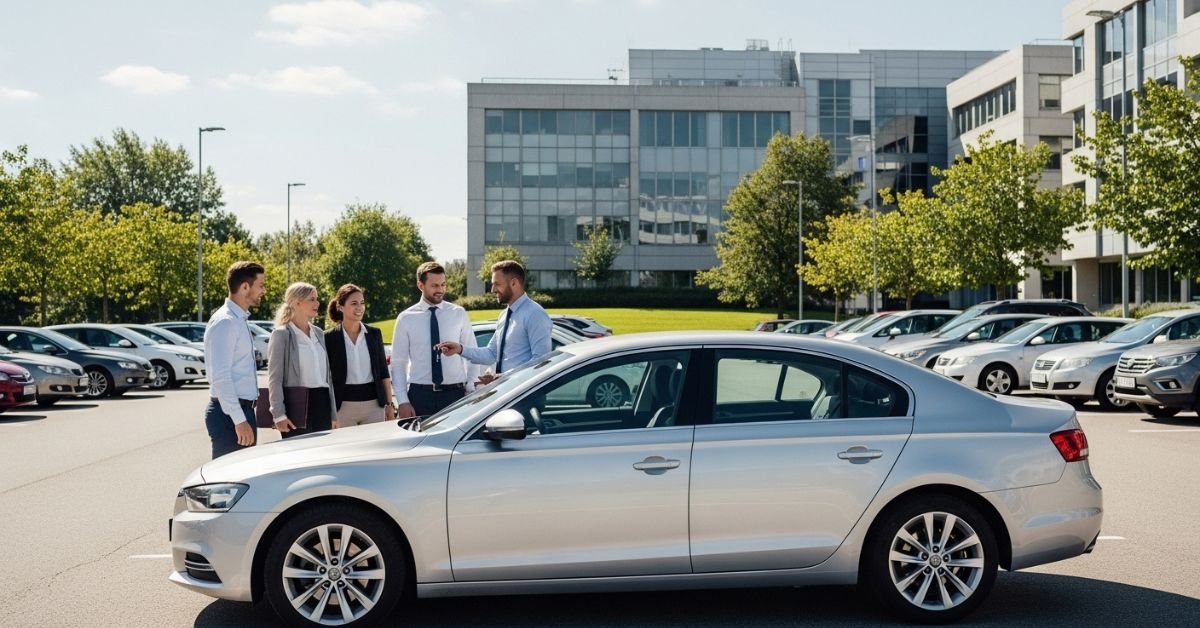Imagine this: You’re at the office, juggling meetings and deadlines. Suddenly, you realize you need to attend an important client meeting across town. Instead of scrambling for a taxi or dealing with public transport, what if there was a smarter way? Enter the pool car—a convenient solution that can streamline your work travel while saving time and costs.
Pool cars are becoming increasingly popular among businesses seeking efficient transportation options for their employees. They offer flexibility and accessibility while reducing the hassle associated with commuting. But how does it all work? What benefits do they bring to your workplace?
In this blog post, we’ll dive into everything you need to know about pool cars—from their meaning and advantages to practical tips on usage and maintenance. Let’s explore how incorporating pool cars into your business strategy can transform employee travel experiences!
Contents
What is a Pool Car?
A pool car is a vehicle that companies provide for employees to share, primarily for work-related travel. Instead of each employee using their own personal car or relying on taxis, businesses designate certain vehicles as “pool cars” available for anyone needing them.
These cars are typically parked at the office or a designated location. Employees can book them through a simple scheduling system, ensuring everyone has access when needed.
Pool cars come in various forms—sedans, vans, or even electric vehicles—depending on company needs and preferences.
This arrangement not only cuts down on transportation costs but also encourages smarter use of resources within an organization. By sharing vehicles, companies can foster collaboration while minimizing their carbon footprint.
The Benefits of Using a Pool Car for Work Travel
Using a pool car for work travel can significantly enhance efficiency. It offers employees easy access to vehicles without the hassle of arranging personal transport.
Cost savings is another major advantage. Companies can reduce expenses related to vehicle ownership, such as insurance and maintenance costs. Pool cars streamline these expenses by consolidating resources.
Flexibility plays a vital role too. Employees can book a car on-demand, adapting their schedules as needed. This ability boosts productivity and ensures timely arrivals at meetings or events.
Moreover, having designated pool cars promotes sustainability. Businesses often choose fuel-efficient models, contributing to lower emissions and supporting corporate social responsibility initiatives.
It fosters collaboration among team members. Sharing rides encourages communication and strengthens relationships within the workplace—an often overlooked benefit that enhances teamwork in more ways than one.
How to Use a Pool Car Effectively
To use a pool car effectively, start by familiarizing yourself with the vehicle. Check its features and controls before hitting the road. This ensures a smooth experience.
Next, plan your trips in advance. Consider routes, time frames, and any stops along the way. A well-structured itinerary saves both time and fuel.
Always keep the car organized. Store necessary items like chargers or documents where they are easily accessible. This avoids distractions while driving.
Before returning the vehicle, ensure it’s clean and refueled if required. Leaving it in good condition helps maintain a positive environment for all users.
Communicate openly with colleagues about availability and usage schedules. Keeping everyone informed minimizes conflicts over bookings and encourages collaboration within teams.
Tips for Maintaining a Pool Car
Regular maintenance is key to keeping a pool car in top shape. Start with consistent oil changes, as this ensures the engine runs smoothly and efficiently.
Check tire pressure routinely. Properly inflated tires enhance fuel efficiency and improve safety on the road. Don’t forget to inspect tread depth too.
Cleaning both the exterior and interior helps maintain aesthetics and hygiene. A clean vehicle leaves a good impression for business trips.
Make sure to schedule routine inspections. Catching issues early can save time and money in the long run.
Document all repairs and maintenance activities carefully. This creates a reliable history that can be useful for future reference or resale value.
Encourage users to report any problems immediately. Quick communication prevents small issues from turning into major headaches down the line.
Alternatives to Pool Cars for Work Travel
When considering alternatives to pool cars for work travel, ride-sharing services come to mind. Apps like Uber and Lyft offer convenience without the hassle of vehicle maintenance or insurance.
Public transportation is another viable option. Trains, buses, and trams can be budget-friendly ways to navigate urban environments. Many cities have extensive networks that make commuting easy.
Biking has gained popularity as a sustainable choice. Companies can incentivize employees by providing bike rental options or docking stations on-site.
For longer distances, car rentals might be preferable. They allow flexibility without committing to owning a fleet of vehicles.
Virtual meetings are reshaping how businesses approach travel. With advances in technology, many tasks can now be accomplished through video conferencing tools, reducing the necessity for physical presence altogether.
Case Studies: Companies Successfully Implementing Pool Cars
Company A, a leading tech firm, adopted a pool car system to streamline its employee travel. By offering easy access to vehicles for meetings and client visits, they reduced individual mileage claims by 30%. This not only cut costs but also improved productivity.
Another example is Company B, an environmental consultancy that focused on sustainability. They implemented electric pool cars as part of their green initiative. Employees embraced this change enthusiastically, contributing to a significant reduction in carbon emissions.
Meanwhile, Company C saw enhanced collaboration through shared rides. Their employees reported feeling more connected during commutes since they often traveled together for work-related events or conferences.
These case studies demonstrate how effectively managing pool cars can lead to operational efficiencies while fostering teamwork among staff members. Each company tailored the program based on specific needs and values, showcasing the versatility of this approach in various industries.
Also Read Our Latest Post!
Carbus – Meaning, Types, and How It’s Changing Public Transportation
Conclusion
The concept of a pool car offers significant advantages for businesses looking to streamline travel for employees. By understanding its meaning and benefits, companies can leverage this resource effectively. With proper usage guidelines and maintenance tips, organizations can maximize the utility of their pool cars.
Moreover, exploring alternatives ensures that businesses remain adaptable in an ever-evolving work environment. The success stories from various companies demonstrate how implementing a pool car system can lead to increased efficiency and reduced costs.
As more organizations seek sustainable and cost-effective solutions for employee transportation, the adoption of pool cars seems like a forward-thinking choice. Embracing such strategies not only fosters better travel management but also supports valuable company goals regarding sustainability and productivity.




